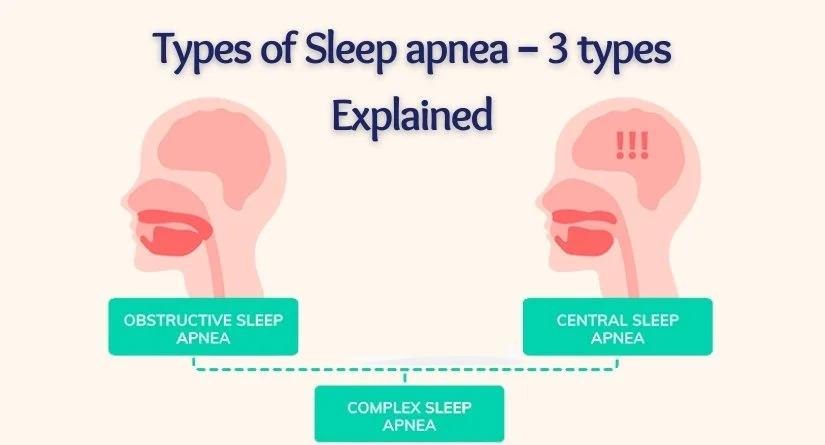Introduction: Understanding Sleep Apnea
Goodnight’s sleep, an essential aspect of our lives, is often taken for granted until it’s disrupted. One such disruptor is sleep apnea. Sleep apnea is more than just snoring or feeling tired during the day; it’s a serious sleep disorder that requires medical attention. In this article, we’ll delve into the different types of sleep apnea, their causes, symptoms, diagnosis, and treatment methods. We aim to enlighten you on why it’s essential to seek medical help if you suspect you might be grappling with this condition.
What is Sleep Apnea?
Sleep apnea is a condition characterized by interruptions or pauses in breathing during sleep. It may seem like someone is choking or gasping for air. These pauses can last from a few seconds to minutes and can occur up to 30 times or more in an hour. People with untreated sleep apnea can stop breathing hundreds of times during the night.
Now, let’s take a closer look at the types of sleep apnea.
Types of Sleep Apnea
There are three primary types of sleep apnea:
- Obstructive Sleep Apnea (OSA)
- Central Sleep Apnea (CSA)
- Complex or Mixed Sleep Apnea
Each type varies in causes, symptoms, and treatments.
Obstructive Sleep Apnea (OSA)
Obstructive Sleep Apnea is the most common type of sleep apnea, accounting for approximately 85% of all cases. It occurs when the soft tissue in the back of the throat collapses, blocking the airway during sleep.
Causes of Obstructive Sleep Apnea
The leading cause of OSA is a physical blockage in the upper airway, usually when the soft tissue in the rear of the throat collapses and closes off during sleep. Other factors that may contribute include:
- Being overweight or obese, which increases the likelihood of having fatty tissues that can obstruct the airway
- Age, as the risk of OSA increases with age
- Genetics, as those with a family history of OSA are more likely to develop the condition
- Certain medical conditions like hypothyroidism or acromegaly
- Lifestyle factors such as alcohol consumption, smoking, and sedative use
Symptoms of Obstructive Sleep Apnea
While loud snoring is often a telltale sign of OSA, not all who snore have sleep apnea. Other symptoms to watch out for include:
- Pauses in breathing during sleep observed by another person
- Choking or gasping sounds
- Daytime sleepiness or fatigue
- Morning headaches
- Irritability or depression
- Night sweats
- Difficulty concentrating
Diagnosis and Treatment of Obstructive Sleep Apnea
OSA diagnosis usually involves an evaluation of your medical history, physical examination, and a sleep study test called polysomnography. In some cases, a home sleep apnea test may be an option.
Treatment options for OSA can include lifestyle changes, Continuous Positive Airway Pressure (CPAP) devices, oral appliances, positional therapy, and in severe cases, surgery.
Central Sleep Apnea (CSA)
Central Sleep Apnea is less common than OSA, accounting for about 10% of sleep apnea cases. It involves a disconnection between the brain and the muscles that control breathing.
Causes of Central Sleep Apnea
Unlike OSA, CSA is not due to a physical blockage. Instead, it happens when the brain fails to send signals to the muscles that control breathing. Factors that contribute to CSA include:
- Conditions affecting the brainstem, such as stroke or brain tumor
- Certain medical conditions, such as heart failure or kidney failure
- Use of certain medications like opioids
- High altitude
Symptoms of Central Sleep Apnea
Like OSA, CSA is also associated with frequent awakenings during the night and excessive daytime sleepiness. Other symptoms include:
- Shortness of breath that improves when sitting up
- Difficulty staying asleep
- Lack of snoring
- Morning headaches
- Mood changes, difficulty concentrating
Diagnosis and Treatment of Central Sleep Apnea
Similar to OSA, CSA is also diagnosed with a sleep study test.
Treatment typically involves managing the underlying condition, such as heart or kidney disease. Additionally, devices to assist with breathing during sleep, such as CPAP or Adaptive Servo-Ventilation (ASV), may be used.
Complex or Mixed Sleep Apnea
Complex sleep apnea, as the name suggests, is a combination of both OSA and CSA. This type is less common and usually becomes apparent when someone with OSA undergoes treatment.
Impact of Sleep Apnea on Overall Health
Sleep apnea, if left untreated, can lead to a plethora of health complications, such as:
- High blood pressure
- Heart disease
- Stroke
- Diabetes
- Depression
- Worsening of ADHD
It’s vital to identify and treat sleep apnea to reduce these risks and improve the overall quality of life.
Frequently Asked Questions
1. Can Sleep Apnea be fatal?
Yes, severe untreated sleep apnea can lead to life-threatening complications like heart disease and stroke.
2. Can weight loss cure sleep apnea?
While it’s not a surefire cure, losing weight can significantly reduce or even eliminate sleep apnea symptoms in people who are overweight.
3. How is sleep apnea diagnosed?
Sleep apnea is usually diagnosed through a sleep study test called polysomnography, which records brain waves, heart rate, and breathing patterns during sleep.
4. What’s the main difference between OSA and CSA?
The main difference is that OSA occurs due to a physical blockage in the airway, while CSA happens when the brain fails to send signals to the muscles controlling breathing.
5. Is snoring always a sign of sleep apnea?
While snoring can be a sign of sleep apnea, not everyone who snores has the condition. Conversely, not everyone with sleep apnea snores.
6. Can you have sleep apnea without realizing it?
Yes, many people are unaware they have sleep apnea. They may attribute their daytime sleepiness or fatigue to other factors and not realize their breathing is interrupted during sleep.
Disclaimer
The information provided is for general knowledge only. Consult your doctor for personalized advice and treatment. Medikart HealthCare is not liable for any actions taken based on this info.

